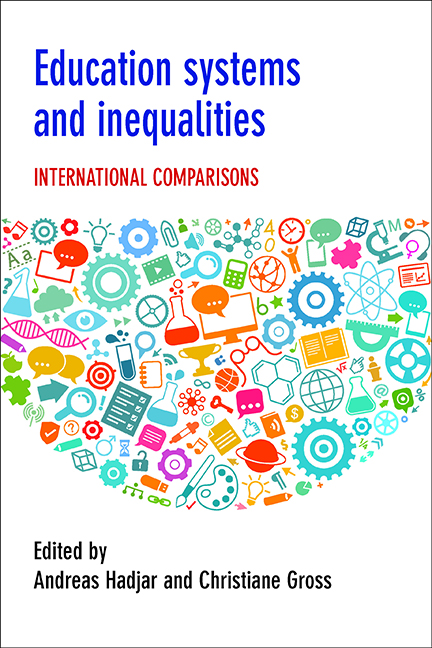Book contents
- Frontmatter
- Contents
- List of tables and figures
- Notes on contributors
- Acknowledgements
- Introduction: education systems and inequalities
- one Theorising the impact of education systems on inequalities
- two Comparing education policies in a globalising world: methodological reflections
- three Education systems and intersectionality
- four Measuring educational institutional diversity: tracking, vocational orientation and standardisation
- five Sorting and (much) more: prior ability, school effects and the impact of ability tracking on educational inequalities in achievement
- six Data analysis techniques to model the effects of education systems on educational inequalities
- seven Education systems and inequality based on social origins: the impact of school expansion and design
- eight Education systems and gender inequalities in educational attainment
- nine Tracking, school entrance requirements and the educational performance of migrant students
- ten From exclusion and segregation to inclusion? Dis/ability-based inequalities in the education systems of Germany and Nigeria
- eleven Education systems and meritocracy: social origin, educational and status attainment
- twelve Education systems and gender inequalities in educational returns
- thirteen Education systems and migrant-specific labour market returns
- fourteen Health returns on education and educational systems
- fifteen Good and bad education systems: is there an ideal?
- Conclusions and summary
- Index
five - Sorting and (much) more: prior ability, school effects and the impact of ability tracking on educational inequalities in achievement
Published online by Cambridge University Press: 05 April 2022
- Frontmatter
- Contents
- List of tables and figures
- Notes on contributors
- Acknowledgements
- Introduction: education systems and inequalities
- one Theorising the impact of education systems on inequalities
- two Comparing education policies in a globalising world: methodological reflections
- three Education systems and intersectionality
- four Measuring educational institutional diversity: tracking, vocational orientation and standardisation
- five Sorting and (much) more: prior ability, school effects and the impact of ability tracking on educational inequalities in achievement
- six Data analysis techniques to model the effects of education systems on educational inequalities
- seven Education systems and inequality based on social origins: the impact of school expansion and design
- eight Education systems and gender inequalities in educational attainment
- nine Tracking, school entrance requirements and the educational performance of migrant students
- ten From exclusion and segregation to inclusion? Dis/ability-based inequalities in the education systems of Germany and Nigeria
- eleven Education systems and meritocracy: social origin, educational and status attainment
- twelve Education systems and gender inequalities in educational returns
- thirteen Education systems and migrant-specific labour market returns
- fourteen Health returns on education and educational systems
- fifteen Good and bad education systems: is there an ideal?
- Conclusions and summary
- Index
Summary
The problem
There is hardly a country without educational inequalities based on social origin. The results of sociological research on inequality in general, international comparative studies, and some systematic comparisons between national studies, however, reveal clear differences (see inter alia, Kao and Thompson, 2003; Müller and Kogan, 2010: 252ff.; Hanushek and Wößmann, 2011). From the very beginning, the various hypotheses of the causes for cross-country differences have suggested the vital importance of educational systems, which differ considerably in terms of their institutional design both internationally and regionally. The core of the discussions on educational systems consists of a question concerning the specific effects of differentiation according to achievement (‘ability tracking’) as compared to integration with a largely common learning, possibly even up to the end of compulsory education.
Ability tracking is justified by the presumption that a homogenisation of learning environments in terms of performance and/or dispositions is advantageous – including for academically weaker pupils. The argument in opposition to such sorting is that less talented pupils could no longer benefit from the more favourable learning environment of an integrated school and would possibly perform worse due to an assignment to lower valued types of schools, entailing stigmatisation and negative self-perception. This will particularly apply if the differentiation is empirically also a matter of stratification: a vertical sorting, for example, into more academic general education in contrast to non-academic, specific or vocational education, varying in terms of the curricula's demands and the qualifications and certificates, which are connected with different levels of prestige and career opportunities (see Allmendinger, 1989: 239ff.; Meier and Schutz, 2007: 5ff.; van de Werfhorst and Mijs, 2010: 409ff.; Betts, 2011: 343ff.). The empirical evidence seems to be clear: pupils apparently display no higher achievement in cases of differentiation, but the effect of social origin, and thus educational inequality, is reinforced when compared to integration without institutional sorting. It is therefore not appropriate to refer to a trade-off between social permeability and the level of achievement in cases of a differentiated educational system. All (recent) reviews of the state of research agree on this: ‘it can be widely taken for granted that early tracking is furthermore associated with the generation of more educational inequality with particular disadvantage for lower class and migrant families’ (Müller and Kogan, 2010: 227, emphasis added).
- Type
- Chapter
- Information
- Education Systems and InequalitiesInternational Comparisons, pp. 95 - 114Publisher: Bristol University PressPrint publication year: 2016



